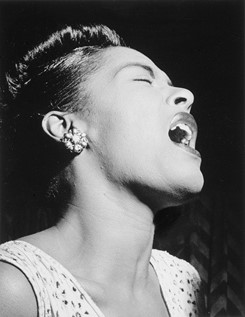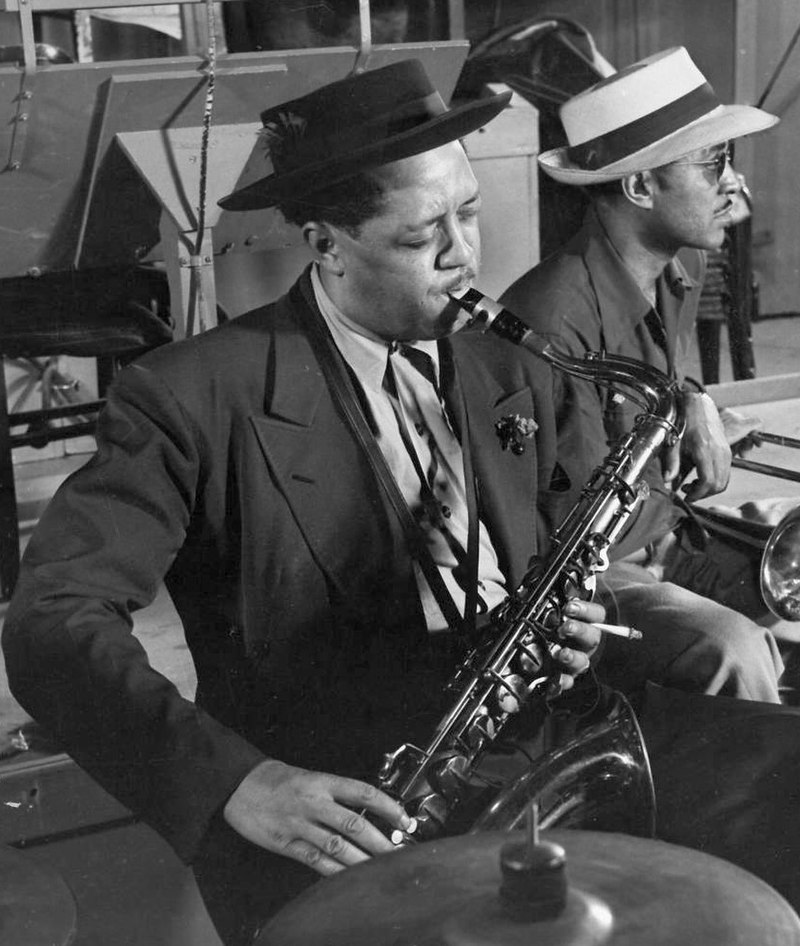
Billie Holiday

Billie Holiday
While jazz is primarily an instrumental genre, a handful of singers are considered jazz musicians in their own right because they treat the voice as an instrument capable of rhythmic and melodic nuance. Their renderings of songs are such compelling and personal statements that their performances represent an improvisation of a sort. In this regard, there are three outstanding singers from this era: Billie Holiday, Mary Lou Williams, and Ella Fitzgerald.
Billie Holiday (1915-1959) is, for many, the most expressive and deeply moving jazz vocalist of any era. Her life was difficult and tragic, yet she was able to transform the painful experiences of her life into beauty through song, albeit a beauty tinged with palpable sadness, particularly in her later years. A particularly poignant example is "Don't Worry 'Bout Me" .
Billie Holiday's childhood was unsettled and tumultuous. Her father was absent, and she spent years away from her mother. She rejoined her mother in the late 1920s. The two suffered together through the early days of the Depression in Harlem. Sometime around 1930, as Billie relates the story, she began singing in this way:

We lived on 145th Street near Seventh Avenue. One day we were so hungry we could barely breathe. I started out the door. It was cold as all-hell and I walked from 145th to 133rd, down Seventh Avenue, going in every joint trying to find work. Finally, I got so desperate I stopped in the Log Cabin Club run by Jerry Preston. I told him I wanted a drink. I didn't have a dime. But I ordered gin (it was my first drink-I didn't know gin from wine) and gulped it down. I asked Preston for a job, told him I was a dancer. He said to dance. I tried it. He said I stunk. I told him I could sing. He said sing. Over in the corner was an old guy playing the piano. He struck 'Travelin' and I sang. The customers stopped drinking. They turned around and watched. The pianist, Dick Wilson, swung into 'Body and Soul.' Jeez, you should have seen these people-all of them started crying. Preston came over, shook his head and said, 'Kid, you win.' That's how I got my start.
(Shapiro 1955, 198-199)

Holiday began singing regularly in Harlem nightspots and was "discovered" in 1933 by John Hammond. He helped launch her broader career by arranging recording dates with Benny Goodman, Teddy Wilson, and others. From the late 1930s came some of her most treasured recordings, especially those that include Lester Young. The two had a deep appreciation for each other's artistry, and some have aptly described their platonic friendship as a "musical romance."
Let's listen to "Lady Day" (so named by Lester Young) in her 1937 recording of “I Must Have That Man” in the company of some of the finest jazz musicians of the day.
At age twenty-one, Holiday's voice is supple and nuanced in its expressiveness, all the more remarkable considering the relatively narrow range of her voice. This recording includes notable solos by Lester Young and Benny Goodman.
Don't Worry 'Bout Me
Don't worry 'bout me Forget about me
Just be happy my love
A-Tisket A-Tasket
A-tisket a-tasket
A green-and-yellow basket
I bought a basket for my mommie
On the way I dropped it






